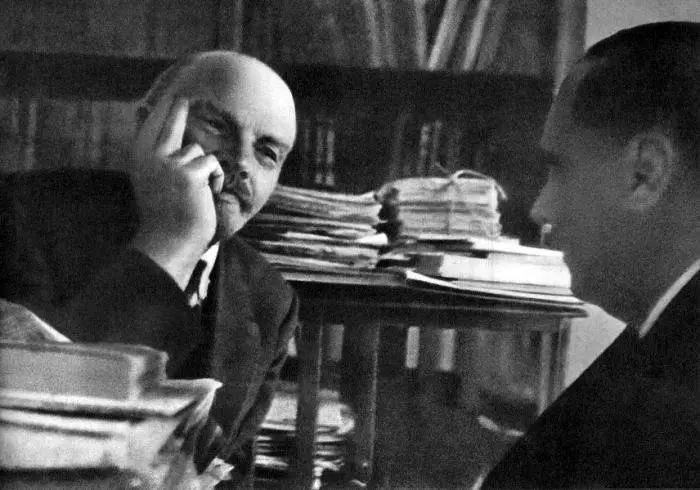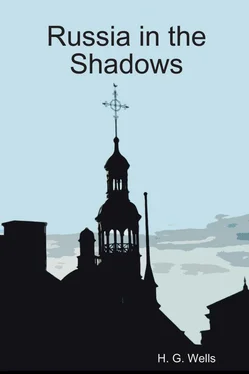Herbert Wells - Russia in the Shadows
Здесь есть возможность читать онлайн «Herbert Wells - Russia in the Shadows» весь текст электронной книги совершенно бесплатно (целиком полную версию без сокращений). В некоторых случаях можно слушать аудио, скачать через торрент в формате fb2 и присутствует краткое содержание. Год выпуска: 1920, Жанр: Публицистика, на английском языке. Описание произведения, (предисловие) а так же отзывы посетителей доступны на портале библиотеки ЛибКат.
- Название:Russia in the Shadows
- Автор:
- Жанр:
- Год:1920
- ISBN:нет данных
- Рейтинг книги:3 / 5. Голосов: 1
-
Избранное:Добавить в избранное
- Отзывы:
-
Ваша оценка:
- 60
- 1
- 2
- 3
- 4
- 5
Russia in the Shadows: краткое содержание, описание и аннотация
Предлагаем к чтению аннотацию, описание, краткое содержание или предисловие (зависит от того, что написал сам автор книги «Russia in the Shadows»). Если вы не нашли необходимую информацию о книге — напишите в комментариях, мы постараемся отыскать её.
Russia in the Shadows — читать онлайн бесплатно полную книгу (весь текст) целиком
Ниже представлен текст книги, разбитый по страницам. Система сохранения места последней прочитанной страницы, позволяет с удобством читать онлайн бесплатно книгу «Russia in the Shadows», без необходимости каждый раз заново искать на чём Вы остановились. Поставьте закладку, и сможете в любой момент перейти на страницу, на которой закончили чтение.
Интервал:
Закладка:
I had come expecting to struggle with a doctrinaire Marxist. I found nothing of the sort. I had been told that Lenin lectured people; he certainly did not do so on this occasion. Much has been made of his laugh in the descriptions, a laugh which is said to be pleasing at first and afterwards to become cynical. This laugh was not in evidence. His forehead reminded me of someone else—I could not remember who it was, until the other evening I saw Mr. Arthur Balfour sitting and talking under a shaded light. It is exactly the same domed, slightly one-sided cranium. Lenin has a pleasant, quick-changing, brownish face, with a lively smile and a habit (due perhaps to some defect in focussing) of screwing up one eye as he pauses in his talk; he is not very like the photographs you see of him because he is one of those people whose change of expression is more important than their features; he gesticulated a little with his hands over the heaped papers as he talked, and he talked quickly, very keen on his subject, without any posing or pretences or reservations, as a good type of scientific man will talk.
Our talk was threaded throughout and held together by two—what shall I call them?— motifs . One was from me to him: «What do you think you are making of Russia? What is the state you are trying to create?» The other was from him to me: «Why does not the social revolution begin in England? Why do you not work for the social revolution? Why are you not destroying Capitalism and establishing the Communist State?» These motifs interwove, reacted on each other, illuminated each other. The second brought back the first: «But what are you making of the social revolution? Are you making a success of it?» And from that we got back to two again with: «To make it a success the Western world must join in. Why doesn't it?»
In the days before 1918 all the Marxist world thought of the social revolution as an end. The workers of the world were to unite, overthrow Capitalism, and be happy ever afterwards. But in 1918 the Communists, to their own surprise, found themselves in control of Russia and challenged to produce their millennium. They have a colourable excuse for a delay in the production of a new and better social order in their continuation of war conditions, in the blockade and so forth, nevertheless it is clear that they begin to realise the tremendous unpreparedness which the Marxist methods of thought involve. At a hundred points—I have already put a finger upon one or two of them—they do not know what to do. But the commonplace Communist simply loses his temper if you venture to doubt whether everything is being done in precisely the best and most intelligent way under the new régime . He is like a tetchy housewife who wants you to recognise that everything is in perfect order in the middle of an eviction. He is like one of those now forgotten suffragettes who used to promise us an earthly paradise as soon as we escaped from the tyranny of «man-made laws.» Lenin, on the other hand, whose frankness must at times leave his disciples breathless, has recently stripped off the last pretence that the Russian revolution is anything more than the inauguration of an age of limitless experiment. «Those who are engaged in the formidable task of overcoming capitalism,» he has recently written, «must be prepared to try method after method until they find the one which answers their purpose best.»
We opened our talk with a discussion of the future of the great towns under Communism. I wanted to see how far Lenin contemplated the dying out of the towns in Russia. The desolation of Petersburg had brought home to me a point I had never realised before, that the whole form and arrangement of a town is determined by shopping and marketing, and that the abolition of these things renders nine-tenths of the buildings in an ordinary town directly or indirectly unmeaning and useless. «The towns will get very much smaller,» he admitted. «They will be different. Yes, quite different.» That, I suggested, implied a tremendous task. It meant the scrapping of the existing towns and their replacement. The churches and great buildings of Petersburg would become presently like those of Novgorod the Great or like the temples of Paestum. Most of the town would dissolve away. He agreed quite cheerfully. I think it warmed his heart to find someone who understood a necessary consequence of collectivism that many even of his own people fail to grasp. Russia has to be rebuilt fundamentally, has to become a new thing….
And industry has to be reconstructed—as fundamentally?
Did I realise what was already in hand with Russia? The electrification of Russia?
For Lenin, who like a good orthodox Marxist denounces all «Utopians,» has succumbed at last to a Utopia, the Utopia of the electricians. He is throwing all his weight into a scheme for the development of great power stations in Russia to serve whole provinces with light, with transport, and industrial power. Two experimental districts he said had already been electrified. Can one imagine a more courageous project in a vast flat land of forests and illiterate peasants, with no water power, with no technical skill available, and with trade and industry at the last gasp? Projects for such an electrification are in process of development in Holland and they have been discussed in England, and in those densely-populated and industrially highly-developed centres one can imagine them as successful, economical, and altogether beneficial. But their application to Russia is an altogether greater strain upon the constructive imagination. I cannot see anything of the sort happening in this dark crystal of Russia, but this little man at the Kremlin can; he sees the decaying railways replaced by a new electric transport, sees new roadways spreading throughout the land, sees a new and happier Communist industrialism arising again. While I talked to him he almost persuaded me to share his vision.
«And you will go on to these things with the peasants rooted in your soil?»
But not only are the towns to be rebuilt; every agricultural landmark is to go.
«Even now,» said Lenin, «all the agricultural production of Russia is not peasant production. We have, in places, large scale agriculture. The Government is already running big estates with workers instead of peasants, where conditions are favourable. That can spread. It can be extended first to one province, then another. The peasants in the other provinces, selfish and illiterate, will not know what is happening until their turn comes….»

It may be difficult to defeat the Russian peasant en masse ; but in detail there is no difficulty at all. At the mention of the peasant Lenin's head came nearer to mine; his manner became confidential. As if after all the peasant might overhear.
It is not only the material organisation of society you have to build, I argued, it is the mentality of a whole people. The Russian people are by habit and tradition traders and individualists; their very souls must be remoulded if this new world is to be achieved. Lenin asked me what I had seen of the educational work afoot. I praised some of the things I had seen. He nodded and smiled with pleasure. He has an unlimited confidence in his work.
«But these are only sketches and beginnings,» I said.
«Come back and see what we have done in Russia in ten years’ time,» he answered.
In him I realised that Communism could after all, in spite of Marx, be enormously creative. After the tiresome class-war fanatics I had been encountering among the Communists, men of formulæ as sterile as flints, after numerous experiences of the trained and empty conceit of the common Marxist devotee, this amazing little man, with his frank admission of the immensity and complication of the project of Communism and his simple concentration upon its realisation, was very refreshing. He at least has a vision of a world changed over and planned and built afresh.
Читать дальшеИнтервал:
Закладка:
Похожие книги на «Russia in the Shadows»
Представляем Вашему вниманию похожие книги на «Russia in the Shadows» списком для выбора. Мы отобрали схожую по названию и смыслу литературу в надежде предоставить читателям больше вариантов отыскать новые, интересные, ещё непрочитанные произведения.
Обсуждение, отзывы о книге «Russia in the Shadows» и просто собственные мнения читателей. Оставьте ваши комментарии, напишите, что Вы думаете о произведении, его смысле или главных героях. Укажите что конкретно понравилось, а что нет, и почему Вы так считаете.


